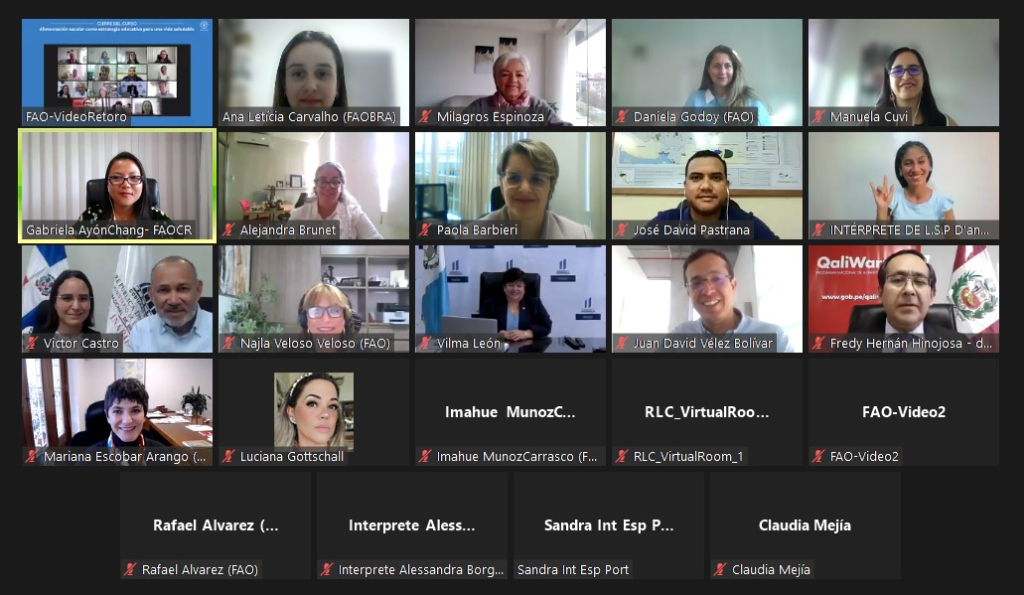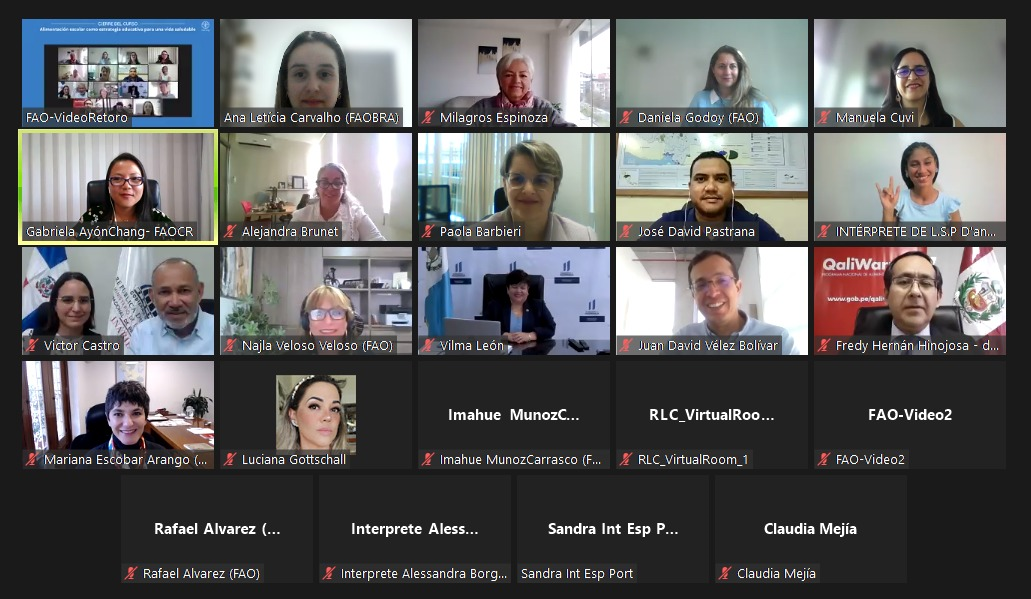Training from the Brazil-FAO International Cooperation was offered to participants from Colombia, Guatemala, Peru, and the Dominican Republic.
Brasilia, Brazil, August 19, 2022. The closing session of the third version of the course “School Feeding as an Educational Strategy for a Healthy Life” had the participation of high-ranking authorities from the 4 participating countries – Colombia, Guatemala, Peru, and the Dominican Republic -, the partners of the Brazil-FAO International Cooperation and more than 1,200 students from the region. The event was broadcasted online and had even emotional moments in the end.
Paola Barbieri, project analyst for the Brazilian Cooperation Agency (ABC), opened the event and highlighted the importance of how the actions of the course promoted training and fomented the experiences’ exchange for capacity building. “I can assure you that this cause will always be a priority; also, I wanted to thank everyone who participated. I invite you to continue working with us.”
Representing the National Fund for Educational Development (FNDE), Luciana Gottschall congratulated the students and said that the training is relevant for the better execution of the school feeding policy. “The school is a very privileged space for the implementation of food and nutrition education actions and the promotion of sustainable development.”

Daniela Godoy, FAO food security officer, pointed out that 56 million people suffered from hunger in 2021 and that food insecurity in the region continues to prevail. She highlighted the role of school feeding, not only ensuring food for students but also promoting healthier and more sustainable food systems.
Israel Ríos, FAO nutrition officer, said that one of the most important achievements of the Brazil-FAO International Cooperation in school feeding, carried out since 2009, was the paradigm shift from a welfare approach to a policy that guarantees the human right to food.
Najla Veloso, the coordinator of the project Consolidation of School Feeding Programmes in LAC, thanked the FAO for saying that this institution is the bridge that allows reaching places where it would not be possible to arrive. “We are a network working towards the school feeding we dream for our students”. Ms. Veloso also presented the data on the joint work among the countries on school feeding. Throughout thirteen years, the Brazil-FAO International Cooperation developed 15 hybrid and virtual courses, 200 events, seminars, workshops, webinars, and exchanges, reaching more than 42,000 people in 19 countries.
Legal frameworks
The masterclass of the closing course, presented by Manuela Cuvi, legal officer of the FAO, was about the role of legal frameworks for school feeding policy. Ms. Cuvi recommended a comprehensive look at the laws and mentioned achievements obtained by legal frameworks in the region, such as increased enrollment rates, reduced school dropouts, product purchases from small producers, and the socioeconomic development of local communities. “Legal frameworks need to be harmonized to enable the various objectives to be achieved and can be addressed by a wide variety of policies.” She concluded by saying that a regulatory framework is a set of instruments and that “laws must be State policies and not Government policies.”
Mariana Escobar, FAO Representative in Peru, said that there is abundant evidence showing that school feeding programmes (SFP) have been fundamental. Especially during the pandemic, SFP guaranteed access to food, despite extended quarantines and the health crisis, droughts, fires, and hurricanes. It is urgent to maintain and strengthen the channels that guarantee the right to food. And in that sense, the SFP are the government’s privileged instruments”.
For Ms. Escobar, this training effort contributes substantially to the public policies’ development around school feeding and its innovations. “Communities of knowledge and exchange of experiences between countries are generated through these courses, which allows progress in horizontal cooperation networks that, we hope, can be sustained over time.”
The course
Milagros Espinoza, the coordinator of the course’s 3rd version, said that a difference in the activity was the interaction with the students, especially when listening to the demands and in the international meetings that brought together school feeding policy agents from the four countries, showing its importance to nations and students. “The course ends here, but our commitment to school feeding still continues,” she said, inviting participants to access the web page of the Sustainable School Feeding Network (RAES) – www.redraes.org. Tutors Alejandra Brunet and David Pastrana also gave their final words to the students, thanking them for their interest and commitment to finishing the activity despite the heavy workload they all faced.
The countries
“The objectives achieved allow the strengthening of the capacities of professionals in the nutrition, education, health, and agriculture areas, for the development and implementation of school feeding programmes,” said Fredy Hinojosa, representing the Qali Warma National School Feeding Program, from Peru. For him, the articulation among all the actors that participate in the provision of the food service is important.
From Guatemala, Vilma Hernández, Deputy Minister of Education, thanked the opportunity to train the country’s professionals, recognizing the importance of exchanging knowledge and experiences. “It is an essential factor for the quality of the program not only for our country but for all the countries of Latin America. We know that the course strengthens our knowledge of food and nutritional security and will be a great support for us to continue creating healthy environments in our schools”.
In turn, Juan David Vélez, from the Food for Learning Unit – UAPA, from Colombia, highlighted the participation of 559 Colombians and the articulation in favor of the beneficiaries of the school feeding programme. He mentioned that the professionals and technicians are responsible for making this policy work and raising the quality, thanking the course organizers and the students.
Therefore, on behalf of the National Institute of Student Welfare – INABIE (by its Spanish acronym), Yomaira Tejada highlighted the importance of training actions such as this course. “This gives us tools to change food systems to ensure access to healthy, safe, and sustainable food.”
Emotion
At the end, Najla Veloso, coordinator of the Brazil-FAO Cooperation school feeding project, reflected on the importance of sharing knowledge and experiences. “The most beautiful way that one can show solidarity is by putting in the hands of others what one has been learning from life’s opportunities. Knowledge is the key that changes human life for everything that one wants to achieve,” she said. “Knowledge changes not only the person who knows, but also who learns, and changes the lives of everyone who can go through the people who learned.”



